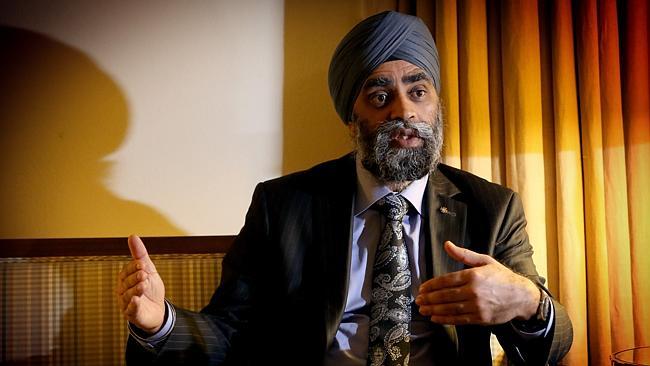Canada’s changing face of intel wants our eyes
The Defence Minister in the government of Canadian Prime Minister Justin Trudeau is a turbaned Sikh, born in India.

The Defence Minister in the government of Canadian Prime Minister Justin Trudeau is a turbaned Sikh, born in India, who became a detective in Vancouver dealing with gangs and then commanded an army force in Afghanistan.
Here for talks with Defence Minister Marise Payne, Harjit Sajjan told The Australian he wanted closer defence ties and stressed the importance of the “Five Eyes” intelligence-sharing alliance, which includes the US, Britain, Australia and New Zealand. “Sharing that information is absolutely critical to the security of all of our nations,” he said.
After his three deployments to Afghanistan, a coalition commander wrote that the then Major Sajjan’s “hard work, personal bravery, and dogged determination undoubtedly saved a multitude of coalition lives”.
The officer said that through his courage and dedication Major Sajjan single-handedly changed the face of intelligence-gathering and analysis in Afghanistan.
After his talks with Senator Payne, Mr Sajjan said Australia’s defence white paper and the costings and industry and capability reviews that went with it were very impressive and would be a valuable model for a similar review in Canada.
Mr Sajjan, who left the army as a lieutenant colonel, said that with the threat of global terrorism the flow of security information from Australia about the Asia-Pacific region was crucial to its allies in the “Five Eyes” alliance.
Mr Sajjan said it was important for ministers to be able to pick up the phone to contact each other and that level of co-operation was bound to filter down through their departments.
He said Canada was looking at doing more in the region. Australia had a better understanding of its dynamics, so working together made it that much easier.
“I am also looking for opportunities for us to deal together with any kinds of threats that might emerge for both of our countries,” Mr Sajjan said.
He was impressed with the way Australia responded to regional disasters, such as the cyclone that ravaged Fiji, and hoped Canada and Australia could work together on similar operations in future.
Australia and Canada operated together in Afghanistan and now worked closely in Iraq. Both were strong and culturally inclusive nations and that gave them great power in such situations.
Mr Sajjan said that, because he wore a turban, some people automatically thought he must be able to communicate with Afghans.
“But I had to learn the culture and some of the language the hard way. I had to go through interpreters,” he said.
“When the Taliban is pushing propaganda that the Christian crusaders are coming and you show up with an infantry section and there’s a female solder, a Filipino, a Chinese, they are surprised by that.”
The key to his success was that when Afghans saw a man born in India wearing the uniform of a Canadian army officer and speaking like a Canadian it made them realise Canada was an open and inclusive society.
“They realised that maybe we were there to help them as well,” Mr Sajjan said. “That’s what diversity brings to the table.”



To join the conversation, please log in. Don't have an account? Register
Join the conversation, you are commenting as Logout